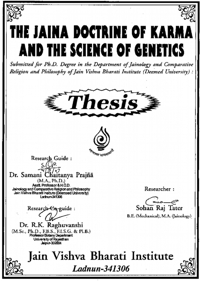The 22 Pariṣahas [7] pertain to enduring of hardship and while doing so remaining in a state of serenity and equanimity so that all karmas may be destroyed. These are more prominently followed by monk and nuns. The 22 types are:
- Hunger
A monk must not accept food which is blemished and prepared with any one of fourty-two faults, even if he has to remain hungry. - Thirst
A monk must not take unboiled water, even if he has to remain thirsty. - Cold
Even when it is cold a monk should not wish for heat. - Heat
Even when it is hot a monk should not wish for cold. - Insect bites
If a monk is bitten by insect while he is medidating he should not brush it away or become irritated, but should tolerate it calmnly. - Clothes
A monk must accept whatever clothes he may receive. - A monk must tolerate evil words told to him.
- A monk must tolerate kicking and beating.
- A monk must tolerate diseases.
- A monk must sleep on a wooden flat bed or coarse grass.
- A monk must not take a bath.
- A monk must wear torn clothes but should not ask for new clothes.
- A monk should not experience shame or helplessness while going for alms from door to door.
- If a monk does not get alms, then he should not become worried and on contrary, should think pleasure having got a chance to perform austerity.
- A monk should not be attracted towards the beauty of woman.
- A monk should not become disturbed by hardship while meditating in a cemetery.
- A monk should not become agitated even when there is suffering or grief.
- A monk should not become proud while being honoured.
- A monk should not become irritated when getting pricked by thorns, etc.
- A monk should not feel sorry for not attaining knowledge even after good efforts.
- If a monk is ignorant and cannot read, he should not become depressed. He must think of karmodaya and must keep his pursuit of knowledge alive.
- A monk must try to understand the message of Jina and should never doubt about it.[8]
 Prof. Dr. Sohan Raj Tater
Prof. Dr. Sohan Raj Tater
 Doctoral Thesis, JVBU
Doctoral Thesis, JVBU